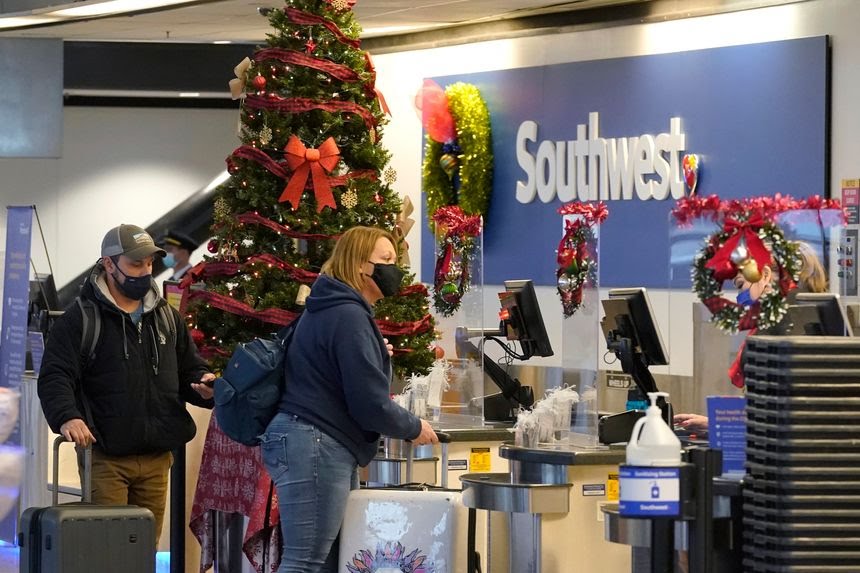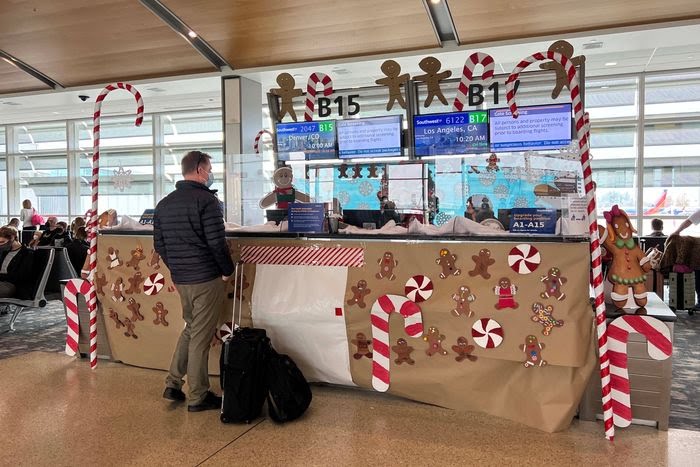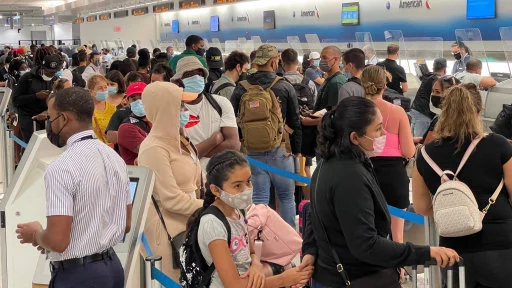Travel and health professionals Allison Pohle and Betsy Morris offer a checklist as you decide whether to gather with relatives or go abroad in coming weeks.

Photo: Daniel Slim/Getty Images
Travelers are once again facing difficult questions about whether to travel as the Omicron variant picks up across the world.
The variant is currently pushing record daily cases in the U.K., and alongside the Delta variant, driving up case counts across the U.S.The wave is leading to renewed restrictions, including indoor mask rules in New York and California.
More than 109 million people are expected to travel for the holidays this year, which is 92% of 2019 levels, according to AAA. Given the heightened concerns, some of those travelers are wondering whether to keep their holiday plans.
Many doctors are saying yes—for now. They and those who study viral transmission say that travel is relatively safe for people who are fully vaccinated and have gotten a booster. The policies for canceling flights and hotels are generally consistent with what they have been in recent months. They can include vouchers for canceled flights, or partial refunds for hotels, but it really depends on what you booked.
“This virus is going to be with us for a very long time, maybe forever. We should do what gives us joy,” says Robert Wachter, chair of the department of medicine at the University of California, San Francisco. “I can’t guarantee that next Christmas will be better than this Christmas.”
What are the risks of traveling?
The main factors for determining your risk in traveling include: your age and vulnerability to the virus, the type of activities you plan, whether they will be indoors, outdoors and how crowded.
You should also weigh how much Covid-19 there is in the region and how much of that virus is the more transmissible Omicron variant. Finally, how important is the travel or activity: Are you going to, say, see a site or are you going to visit parents and grandparents?

Photo: Image oF Sport/Zuma Press
Some of these factors increase your risk of contracting Covid-19, while others put you at more risk if you get it.
When examining the risks of a particular destination, Dr. Wachter says travelers should pause if there are 10 reported cases per 100,000. That may not sound like a lot, he says, but the actual number is probably much higher because many cases are asymptomatic and many others aren’t reported because they are caught at home with rapid testing.
If you haven’t gotten a booster, you should get one today, Dr. Wachter advises. It will give you significantly more protection by next week, when many plan to travel. If you have had only two shots, he says, “I’d consider myself partly vaccinated.”
Can I get refunded for my flight?
Check your airline’s policy. Many airlines have removed change fees, which give fliers more flexibility to postpone. But travelers will still need to pay for any difference in fare for a new ticket.
If the airline cancels your flight, you are entitled to a refund, according to the U.S. Department of Transportation. If you cancel a ticket, you will likely be given a voucher to be used for future travel by a certain date. Each airline has a different policy, and it also depends on the fare class.

Photo: Ted S. Warren/Associated Press
Delta Air Lines is allowing passengers with basic economy tickets who are traveling through Dec. 31 to make changes without a fee. American Airlines basic economy fares bought on or after April 1 are nonrefundable and not changeable.
Airlines specify that you need to make changes to the flight prior to departure. If you don’t show up and haven’t made any changes, you will likely lose the value of your ticket, per airline policies.
Some airlines let you make changes right up until the last minute. Southwest Airlines customers can cancel any ticket at least 10 minutes before departure and keep the amount paid as a credit for future travel.
Can I cancel my hotel?
Travel advisers suggest looking at the booking terms from when you made the reservation.
Many hotels have implemented flexible policies during the pandemic, with some allowing guests to cancel up to 24 hours before arrival. These policies are usually for people who booked directly through the hotel. If you booked through a third party, such as a travel site, your credit card might be charged before arrival, and the booking might not be refundable.
Travel advisers say you need to keep an eye on cancellation windows. During the holiday season, certain types of lodging have stricter policies and often need to be canceled further in advance, such as private villas, says Victoria Zindell, owner at Luxury Ventures Travel, based in Corona del Mar, Calif.
Should I stick with plans to travel internationally?
Do your research. The odds of getting sick increase in places where Covid-19 is surging, and the Centers for Disease Control and Prevention recently updated its list of foreign countries it advises Americans to avoid, classifying Italy and France as “level four,” the highest designation.
The chances of getting stuck in a destination if you test positive are also not zero.
The State Department advises international travelers to make contingency plans in case foreign governments implement restrictions like quarantines and border closures with little notice.
Many countries are rapidly changing requirements around necessary Covid-19 tests for entry. If you plan to travel, even if tests aren’t yet required, you should book an appointment before you leave so you aren’t scrambling to find a test at the last minute, says Ms. Zindell.
And be sure your health insurance will cover you overseas, says Monica Gandhi, an infectious-disease doctor and professor of medicine at UCSF.
What happens if I test positive while out of the U.S.?
It depends where you have traveled and where you’re staying. Generally, if you get a positive result on a rapid antigen test, you’ll have to take a PCR test, says Christine Hardenberger, owner of Modern Travel Professionals, a travel agency based in Fredericksburg, Va. If the PCR test comes back positive, you’ll be given quarantine instructions.
Typically, these restrictions mean to stay in your room where food will be delivered to you, if you are at a resort. But you can’t travel back to the U.S., as you need to show a negative test or documentation of recovery before boarding your flight.
Quarantine requirements in European countries vary, and can add steep expenses to your trip. If you test positive right before leaving Spain, for example, health authorities will tell you to isolate for at least seven days in a local hotel at your own expense, according to the U.S. Embassy in Spain website.
How soon can I return home from an international destination after testing positive?
It depends on the quarantine rules in the country where you’ve been traveling.
When you check in for your flight, airlines usually ask about your Covid-19 exposure within the past 10 days, and require passengers to confirm they have not recently had symptoms. Travelers returning to the U.S. by air have to provide a negative Covid-19 test result taken within one day of departure.
If you are still testing positive because you recently recovered from Covid-19, you can instead travel with proof of recovery. This includes a positive Covid-19 viral test result taken no more than 90 days before the flight’s departure from a foreign country, as well as a letter from a licensed healthcare provider or a public health official clearing you to travel, according to the CDC.
What should I do if I test positive while traveling in the U.S.?
Be prepared for the possibility you might get sick, doctors say.
If that happens, the CDC recommends a quarantine that can end after seven days once a person tests negative and has no symptoms. For those without access to a test, the CDC recommends a 10-day quarantine.
It’s a bad idea to drive back home if you’re sick with Covid-19, said John Volckens, professor of environmental health and an aerosol scientist at Colorado State University in Fort Collins, Colo., because you might get sicker as you travel. “It’s like driving drunk,” he said.
But if you have to get home, it’s better to drive than fly and fine as long as you’re not around other people, Dr. Wachter says.
Source: https://www.wsj.com/


Leave A Comment